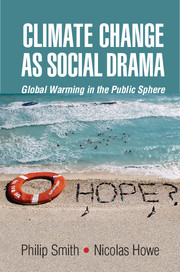Book contents
- Frontmatter
- Contents
- Acknowledgments
- 1 Introduction: The Problem of Climate Change
- 2 Climate Change as Social Drama
- 3 Narrating Global Warming
- 4 An Inconvenient Truth: The Power of Ethos
- 5 Climate Change Art: An Illustrative Failure?
- 6 Climategate and Other Controversies
- 7 The Climate Conference as Theatre
- 8 Local Dramas: The Places of Climate Change
- 9 Conclusion: The Show Must Go On
- References
- Index
9 - Conclusion: The Show Must Go On
Published online by Cambridge University Press: 05 May 2015
- Frontmatter
- Contents
- Acknowledgments
- 1 Introduction: The Problem of Climate Change
- 2 Climate Change as Social Drama
- 3 Narrating Global Warming
- 4 An Inconvenient Truth: The Power of Ethos
- 5 Climate Change Art: An Illustrative Failure?
- 6 Climategate and Other Controversies
- 7 The Climate Conference as Theatre
- 8 Local Dramas: The Places of Climate Change
- 9 Conclusion: The Show Must Go On
- References
- Index
Summary
It may be said that every individual man and all men in common aim at a certain end which determines what they choose and what they avoid. This end, to sum it up briefly, is happiness.
– Aristotle, Rhetoric, 1.5.1360b4–6To argue on the basis of reason alone is a character flaw, a failure of ēthos, and therefore a failure to persuade.
– Eugene Garver (1994, 183)Can climate change make us happy? The question might seem glib, but we ask it in earnest. Happiness, for Aristotle, was the goal of all deliberation. Without showing that he cared first and foremost about the happiness of his audience, a speaker was sunk. Deliberation over climate change is no different. And climate science cannot tell us how to be happy.
Others have made the same point, but they have tended to conceive of happiness in restrictive ways: ethical, psychological, economic. We conceive of happiness in more inclusive sociological terms. It is about more than feelings of security or the promise of prosperity. In the Aristotelian tradition, happiness (eudemonia) is not simply pleasure or contentment but “is something like flourishing human living, a kind of living that is active, inclusive of all that has intrinsic value, and complete” (Nussbaum 2012, 342). In American civil discourse, something like this view of flourishing has echoes in talk of “community” or even “freedom” in the way that they capture the societal actualization of latent possibility. From the perspective of cultural sociology, happiness is, above all, socially integrative. As Durkheim (1965) argued in the Elementary Forms, it arises in the form of solidarity from a complex mixture of shared memories, shared emotions, shared ends, shared activity, and shared symbolic systems.
It also arises from shared beliefs, which, in Aristotle's view (and Durkheim's), are closely linked to shared emotions, including fear. Consensus matters.
- Type
- Chapter
- Information
- Climate Change as Social DramaGlobal Warming in the Public Sphere, pp. 191 - 210Publisher: Cambridge University PressPrint publication year: 2015

